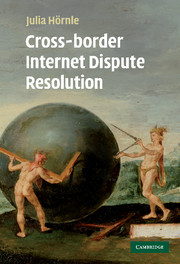Book contents
- Frontmatter
- Contents
- List of illustrations
- List of tables
- Table of cases
- Table of UK statutes
- Table of UK statutory instruments
- Table of European Communities legislation and documents
- Table of foreign statutes
- Table of treaties and conventions
- Acknowledgements
- List of abbreviations
- 1 Introduction
- 2 The concepts of fairness
- 3 Internet disputes
- 4 ADR and applicable law
- 5 ODR and access
- 6 Arbitration and due process
- 7 Internet disputes and fair arbitration
- 8 A model of dispute resolution for the Internet
- Bibliography
- Index
- References
7 - Internet disputes and fair arbitration
Published online by Cambridge University Press: 30 November 2009
- Frontmatter
- Contents
- List of illustrations
- List of tables
- Table of cases
- Table of UK statutes
- Table of UK statutory instruments
- Table of European Communities legislation and documents
- Table of foreign statutes
- Table of treaties and conventions
- Acknowledgements
- List of abbreviations
- 1 Introduction
- 2 The concepts of fairness
- 3 Internet disputes
- 4 ADR and applicable law
- 5 ODR and access
- 6 Arbitration and due process
- 7 Internet disputes and fair arbitration
- 8 A model of dispute resolution for the Internet
- Bibliography
- Index
- References
Summary
Generally, nobody behaves decently when they have power.
(Kingsley Amis, 1922–1995)Introduction
As has been seen in Chapter 3, the Internet as a communications medium harbours a great potential for an increase in cross-border disputes. These disputes may involve individuals (consumers and sole traders) who, before the arrival of the Internet, were unlikely to be involved in cross-border disputes. It has been suggested in Chapter 4 that online arbitration could provide a suitable (binding) method of dispute resolution for many Internet disputes. This raises the question of under what circumstances such arbitration is fair.
The original remit of arbitration was to provide a method of dispute resolution for members of the same industry or trade. Traditionally, the parties were all business members of the same trading community, with shared sets of values. The original type of disputants can be contrasted with the nature of many Internet disputants, who may not share a common background and may well be very diverse indeed.
In traditional commercial arbitration, parties have been allowed to value factors such as efficiency and speed over due process. The preceding chapter has shown that less stringent due process standards have been applied in commercial arbitration (compared to litigation) because of the twin tenets of party autonomy and the waiver doctrine.
It is argued in this chapter that if Internet disputants have no other realistic option but to choose online arbitration, it cannot be said that they freely choose arbitration or that they have opted out of the state court system; hence, the waiver doctrine should not apply in the model espoused here.
Information
- Type
- Chapter
- Information
- Cross-border Internet Dispute Resolution , pp. 169 - 219Publisher: Cambridge University PressPrint publication year: 2009
